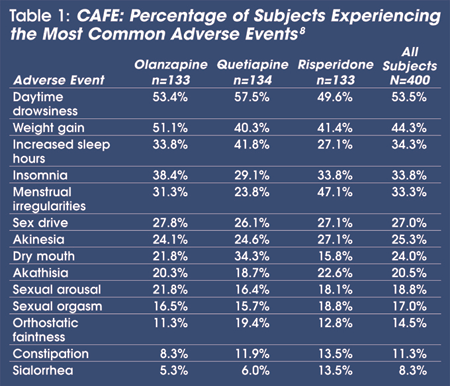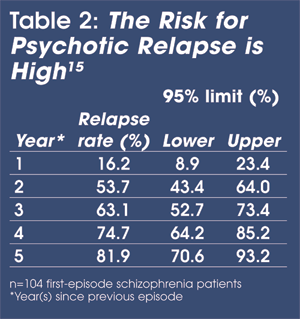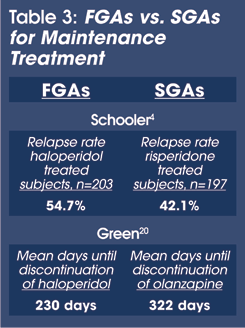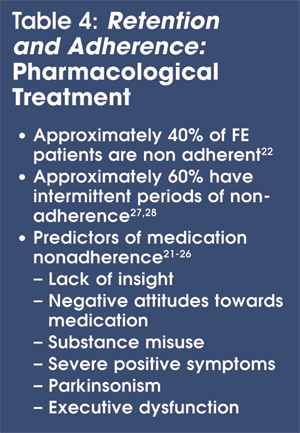Print Friendly
Practical Dosing Strategies in the Treatment of Schizophrenia: Part 1 - First-Episode Schizophrenia

Delbert Robinson, MD
Professor of Psychiatry and Behavioral Sciences, Albert Einstein College of Medicine
CME Course Director
James C.-Y. Chou, MD
Associate Professor of Psychiatry at Mount Sinai School of Medicine

Accreditation Statement
This activity has been planned and implemented in accordance with the Essential Areas and policies of the Accreditation Council for Continuing Medical Education (ACCME) through the joint sponsorship of the Mount Sinai School of Medicine and MBL Communications, Inc. The Mount Sinai School of Medicine is accredited by the ACCME to provide continuing medical education for physicians.
Credit Designation
The Mount Sinai School of Medicine designates this educational activity for a maximum of 1 AMA PRA Category 1 Credit™. Physicians should only claim credit commensurate with the extent of their participation in the activity.
Faculty Disclosure Policy Statement
It is the policy of the Mount Sinai School of Medicine to ensure objectivity, balance, independence, transparency, and scientific rigor in all CME-sponsored educational activities. All faculty participating in the planning or implementation of a sponsored activity are expected to disclose to the audience any relevant financial relationships and to assist in resolving any conflict of interest that may arise from the relationship. Presenters must also make a meaningful disclosure to the audience of their discussions of unlabeled or unapproved drugs or devices.
Statement of Need
Clinicians treating patients with first-episode schizophrenia can draw upon the vast literature on the treatment of patients with multi-episode schizophrenia. There are limitations, however, to how the multi-episode evidence base applies to first-episode scenarios.
Patients with first-episode schizophrenia generally show high positive symptom improvement with antipsychotic treatment. First-episode patients often respond to a lower medication dose than is required for response in patients with multi-episodes of schizophrenia. Importantly, however, first-episode patients are also more likely than multi-episode patients to experience adverse events. Clinicians treating early-phase patients must be particularly vigilant about assessing for potential side effects.
First-episode patients have an 81.9% chance of relapse within five years of initial episode. Medication adherence is the greatest predictor of relapse. Approximately 40% of first-episode patients are non-adherent, and ~60% have intermittent periods of non-adherence. Studies suggest that patients receiving second-generation antipsychotics are less likely to be non-adherent.
Sustained recovery is not common. Only 13.7% of first-episode patients have ≥2 years of full recovery. Recent and upcoming large-scale studies are investigating integrated treatments for first-episode schizophrenia, combining psychosocial interventions with medication. Whether these treatments hold a significant long-term advantage over care-as-usual is yet to be determined.
Target Audience
This activity will benefit psychiatrists, hospital staff physicians, and office-based “attending” physicians from the community.
Learning Objectives
• Interpret clinical evidence regarding the dosage, efficacy and safety profiles of pharmacotherapeutic agents to treat first-episode schizophrenia
• Integrate psychoeducation into treatment strategies to improve cognitive symptoms in first-episode schizophrenia
Faculty Disclosure
Delbert Robinson, MD, has, within the past one year, received grant support from the National Institute of Mental Health (MH 60004); Bristol-Myers Squibb and Janssen provide medication supplies for Dr. Robinson’s research.
James C.-Y. Chou, MD, has, within the past one year, received honoraria from AstraZeneca, Bristol-Myers Squibb, Eli Lilly, GlaxoSmithKline, Janssen, Merck, Novartis, and Pfizer.
Eran Chemerinski, MD, Assistant Professor of Psychiatry at Mount Sinai School of Medicine, reports no affiliations with, or financial interests in, any organization that may pose a conflict of interest.
Activity Review Information
The activity content has been peer-reviewed by Eran Chemerinski, MD. Review Date: January 28, 2010.
Acknowledgment of Commercial Support
Funding for this activity has been provided by an educational grant from Pfizer Inc.
To Receive Credit for this Activity
Read this poster, reflect on the information presented, and then complete the CME posttest found in the accompanying brochure or online (mbl.cmeoutreach.com). To obtain credit you should score 70% or better. The estimated time to complete this activity is 1 hour.
Release Date: March 29, 2010
Termination Date: March 29, 2012
Introduction
Clinicians treating patients with first-episode (FE) schizophrenia can draw upon the vast literature on the treatment of patients with multiple-episode schizophrenia. Studies with multi-episode patients, however, may not fully generalize to the treatment of FE patients. Studies with multi-episode patients typically recruit from hospitals or other acute care units, settings where patients usually have been either non-responsive or non-adherent to previous treatment, or mixtures of both. Studies of multi-episode patients therefore tend to include patients who are not fully responsive to treatment. Without the filter of prior treatment history, FE compared with multi-episode patients may show a broader range of treatment patterns, ranging from extremely good to very poor. Further, studies of FE patients may be very instructive about side effects, as the confounding effect of prior medication use is particularly important with side effects. Finally, data suggest that much of the deterioration (eg, more severe negative symptoms) associated with schizophrenia may occur during the 5 years following illness onset. Providing patients with better treatment at illness onset offers the hope of improving their long-term outcome.
FE studies do have limitations. Relatively few new cases of schizophrenia occur each year. The typically chronic course of schizophrenia results in a large number of patients with multi-episode schizophrenia for every FE patient at any one time. Recruitment for studies of FE schizophrenia compared with those of multi-episode schizophrenia is often more difficult given the smaller number of available patients. We systematically know less about the treatment of FE patients than we do about the treatment of multi-episode patients.
Treatment of the Initial Episode of Schizophrenia
Five major contemporary studies1-5 of FE schizophrenia with strict, albeit varied, response criteria all found higher response rates (primarily based upon positive symptom improvement) than the rates typically found in studies of multi-episode schizophrenia. This is especially remarkable, because response criteria are usually more stringent in FE compared with multi-episode studies. No antipsychotic has shown superior efficacy for the treatment of an initial psychotic episode, which may be due to the overall high rate of response by FE patients. For example, chloropramazine and clozapine showed equal efficacy after 1-year in a study2 comparing them as the initial treatment for FE schizophrenia. This outcome differs from the results with treatment-resistant multi-episode patients, where clozapine shows superior efficacy.6,7

Another notable feature about FE treatment is that the average doses of medication are usually lower than those used with multi-episode patients. Quetiapine, and possibly ziprasidone, dosing may be an exception.8,9
Cognitive Outcomes
Studies with FE patients comparing scores on cognitive tests longitudinally have found modest improvements with treatment with a variety of antipsychotics.10-13 However, these improvements in test scores may not be due solely to improvement in cognitive ability.
Effect sizes allow assessment of the magnitude of improvement with a treatment. An effect size of 0.2 is consistent with a small effect, 0.5 with a medium effect, and 0.8 with a large effect. Goldberg and colleagues14 assessed cognition at baseline and at weeks 6 and 16 in a group of FE patients being treated with olanzapine or risperidone and a matched sample of healthy control subjects. Cognition improved in all groups to a small to moderate degree (effect size for cognitive change was 0.33 in the healthy control group and 0.36 in the FE patients). We would not anticipate that the actual cognitive ability of the health control group would improve over time, as they were receiving no treatment. The very similar improvement between patient and control subjects suggests that cognitive test score improvement was likely due to practice effects, ie, patients and controls did better on subsequent tests because they had seen the tests before. In contrast to the small effect size for cognitive change, the effect size for positive symptom improvement in the same study was extremely large—between 1.25 and 1.5. Available treatments have the ability to improve positive symptoms greatly, but, unfortunately, may have very little effect on cognitive symptoms.
Adverse Events in First-Episode Schizophrenia
Even with low dose medication strategies, patients with FE schizophrenia often experience substantial side effects. Typical of side effect patterns with FE patients are results from the CAFE trial comparing olanzapine, quetiapine, and risperidone.8 Side effects across multiple domains were frequent for all the medications (Table 1). Clinicians treating early-phase patients must be particularly vigilant about assessing for potential side effects. Metabolic side effects have important implications for long-term health outcomes. Unfortunately, early-phase patients tend to be more susceptible to antipsychotic metabolic side effects than older patients.3,5,8
Maintenance Treatment of Early-Phase Schizophrenia
Although the initial psychotic episode typically is very responsive to treatment, relapse rates are high during the first years of the illness, with as many as 81.9% of early-phase patients suffering relapse within the first five years of treatment (Table 2).15
 Given the frequency of relapse, a critical question is how to minimize relapse risk. Placebo-controlled studies have demonstrated a significant advantage for maintenance antipsychotic treatment for relapse prevention with FE patients.16-19
Given the frequency of relapse, a critical question is how to minimize relapse risk. Placebo-controlled studies have demonstrated a significant advantage for maintenance antipsychotic treatment for relapse prevention with FE patients.16-19
Medication adherence is by far the most powerful predictor of relapse.15 Patients who stop maintenance medication have a relapse rate approximately five times greater than those who continue on their antipsychotic medications.15
Although no particular agents are superior to others for treatment of the initial episode of schizophrenia, second-generation agents (SGAs) may be more effective as maintenance treatment for first-episode patients, at least in comparison with haloperidol (Table 3).4,20
A randomized, placebo-controlled comparison of risperidone (mean modal dose 3.3 mg) and haloperidol (mean modal dose 2.9 mg) found equal efficacy for acute treatment of the initial episode but a better chance of remaining relapse-free on risperidone.4 The median time to relapse was 466 days for patients given risperidone and 205 days for those given haloperidol.

A recent maintenance study comparing haloperidol with amisulpride (not approved for use in the United States), olanzapine, quetiapine, and ziprasidone found that patients maintained on haloperidol discontinued their medication significantly sooner than patients on the SGAs.9 There was no statistically significant difference between the three SGAs. These results suggest that SGAs as a group may be more beneficial than haloperidol for maintenance treatment. Whether SGAs are more beneficial for maintenance treatment than first-generation agents, other than haloperidol, has not been studied.
FE patients have, unfortunately, a strong tendency to become non-adherent with treatment. Rates of non-adherence range from 40% to 60% (Table 4).21-26 Some of the factors common to non-adherence in multi-episode patients—lack of income, substance use, Parkinsonian side effects—are also associated with non-adherence by FE patients. In addition, FE patients with poor executive function, and other cognitive deficits, have been shown to be less likely to continue their medication.23
Recovery
Proposed recovery criteria for schizophrenia29 require that patients do well in four separate domains (symptoms remission, appropriate role functioning, performing day-to-day living tasks, and social interactions outside the family) continuously for a 2-year period. An investigation30 of 118 FE patients found that by 5-year follow-up 47.2% of subjects had symptom remission for 2 years or longer and 25.5% had adequate social functioning for ≥2 years. Only 13.7% of patients had, however, a ≥2 year period of full recovery. The low rate of full recovery highlights the need for further efforts to improve outcomes for FE patients.

Psychosocial Interventions for Individuals at the First Episode of Psychosis
Psychosocial interventions are an important part of improving outcomes for patients with FE psychosis. Some of the modalities studied individually include psychoeducation with patients and families, cognitive behavioral therapy for symptom control, vocational and educational programs, and family work. Substance misuse is very common with FE patients and requires its own intervention.
The efficacy of treatment programs offering several psychosocial modalities provided by specialized teams, along with medication treatment, is an area of active research. Two large studies, one in the United Kingdom and one in Denmark, have evaluated integrated treatment programs. The LEO trial31 demonstrated a reduced risk of relapse over an 18-month follow-up for patients in an integrated treatment program. The OPUS trial32 found that patients in an integrated program, compared with care as usual, showed positive symptom improvement and better treatment adherence at two years. At 5-year follow-up, however, the differences between patients given integrated treatment versus usual care were marginal. The NIMH has recently initiated the RAISE (Recovery After an Initial Schizophrenia Episode) study, which will evaluate the efficacy of integrated treatments in the United States. RAISE is in the start-up phase, with the study projected to begin in 2010.
Case Report
Ms. A was a 17-year-old high school student who had been doing well academically and socially. She began to believe that people outside her home were conspiring to harm her and her family and began hearing noises from the conspirators. Ms. A’s family brought her to the hospital after repeated unsuccessful attempts to persuade her that no one was conspiring to harm them. Her medical and psychiatric history before the current episode was unremarkable. She was started on a low dose of risperidone, eventually reaching a dose of 2 mg/day. After four weeks of treatment Ms. A had no hallucinations and no specific delusions, but remained globally suspicious. These symptoms, too, resolved after 10 weeks. Despite being on a very low dose, she experienced sedation and extrapyramidal symptoms.
Ms. A did not want her peers to know about her psychiatric hospitalization. With the support of her therapist, she resumed her education at a different high school. After 9 months of successful treatment, Ms. A decided to stop treatment, because she did not want her new boyfriend to know that she had a problem. Four months after treatment cessation, her hallucinations and delusions returned. The content was similar, but the hallucinations and delusions were more intense than during her first episode. She resumed treatment and responded well, but it took longer the second time for her to experience a full resolution of her illness.
Ms. A illustrates some of the points we have discussed. Her response to treatment in terms of positive symptom improvement was very good. Despite the low dose of medication, she had side effects. She also shows that even patients who do very well are at great risk for relapse when they stop maintenance treatment. Even though she responded well to medication treatment, she benefited by psychosocial support to maximize her potential for recovery.
To complete the posttest for the Free CME Activity, please visit mbl.cmeoutreach.com
References
1. Emsley RA. Risperidone in the treatment of first-episode psychotic patients: a double-blind multicenter study. Risperidone Working Group. Schizophr Bull. 1999;25(4):721-729.
2. Lieberman JA, Phillips M, Gu H, et al. Atypical and conventional antipsychotic drugs in treatment-naive first-episode schizophrenia: a 52-week randomized trial of clozapine vs chlorpromazine. Neuropsychopharmacology. 2003;28(5):995-1003.
3. Lieberman JA, Tollefson G, Tohen M, et al. Comparative efficacy and safety of atypical and conventional antipsychotic drugs in first-episode psychosis: a randomized, double-blind trial of olanzapine versus haloperidol. Am J Psychiatry. 2003;160(8):1396-1404.
4. Schooler N, Rabinowitz J, Davidson M, et al. Risperidone and haloperidol in first-episode psychosis: a long-term randomized trial. Am J Psychiatry. 2005;162(5):947-953.
5. Robinson DG, Woerner MG, Napolitano B, et al. Randomized comparison of olanzapine versus risperidone for the treatment of first-episode schizophrenia: 4-month outcomes. Am J Psychiatry. 2006;163(12):2096-2102.
6. McEvoy JP, Lieberman JA, Stroup TS, et al. Effectiveness of clozapine versus olanzapine, quetiapine, and risperidone in patients with chronic schizophrenia who did not respond to prior atypical antipsychotic treatment. Am J Psychiatry. 2006;163(4):600-610.
7. Kane J, Honigfeld G, Singer J, Meltzer H. Clozapine for the treatment-resistant schizophrenic. A double-blind comparison with chlorpromazine. Arch Gen Psychiatry. 1988;45(9):789-796.
8. McEvoy JP, Lieberman JA, Perkins DO, et al. Efficacy and tolerability of olanzapine, quetiapine, and risperidone in the treatment of early psychosis: a randomized, double-blind 52-week comparison. Am J Psychiatry. 2007;164(7):1050-1060.
9. Kahn RS, Fleischhacker WW, Boter H, et al. Effectiveness of antipsychotic drugs in first-episode schizophrenia and schizophreniform disorder: an open randomised clinical trial. Lancet. 2008;371(9618):1085-1097.
10. Harvey PD, Rabinowitz J, Eerdekens M, Davidson M. Treatment of cognitive impairment in early psychosis: a comparison of risperidone and haloperidol in a large long-term trial. Am J Psychiatry. 2005;162(10):1888-1895.
11. Keefe RS, Seidman LJ, Christensen BK, et al. Comparative effect of atypical and conventional antipsychotic drugs on neurocognition in first-episode psychosis: a randomized, double-blind trial of olanzapine versus low doses of haloperidol. Am J Psychiatry. 2004;161(6):985-995.
12. Keefe RS, Sweeney JA, Gu H, et al. Effects of olanzapine, quetiapine, and risperidone on neurocognitive function in early psychosis: a randomized, double-blind 52-week comparison. Am J Psychiatry. 2007;164(7):1061-1071.
13. Davidson M, Galderisi S, Weiser M, et al. Cognitive effects of antipsychotic drugs in first-episode schizophrenia and schizophreniform disorder: a randomized, open-label clinical trial (EUFEST). Am J Psychiatry. 2009;166(6):675-682.
14. Goldberg TE, Goldman RS, Burdick KE, et al. Cognitive improvement after treatment with second-generation antipsychotic medications in first-episode schizophrenia: is it a practice effect? Arch Gen Psychiatry. 2007;64(10):1115-1122.
15. Robinson D, Woerner MG, Alvir JM, et al. Predictors of relapse following response from a first episode of schizophrenia or schizoaffective disorder. Arch Gen Psychiatry. 1999;56(3):241-247.
16. Kane JM, Rifkin A, Quitkin F, Nayak D, Ramos-Lorenzi J. Fluphenazine vs placebo in patients with remitted, acute first-episode schizophrenia. Arch Gen Psychiatry. 1982;39(1):70-73.
17. Crow TJ, MacMillan JF, Johnson AL, Johnstone EC. A randomised controlled trial of prophylactic neuroleptic treatment. Br J Psychiatry. 1986;148:120-127.
18. McCreadie RG, Wiles D, Grant S, et al. The Scottish first episode schizophrenia study. VII. Two-year follow-up. Scottish Schizophrenia Research Group. Acta Psychiatr Scand. 1989;80(6):597-602.
19. Hogarty GE, Ulrich RF. The limitations of antipsychotic medication on schizophrenia relapse and adjustment and the contributions of psychosocial treatment. J Psychiatr Res. 1998;32(3-4):243-250.
20. Green AI, Lieberman JA, Hamer RM, et al. Olanzapine and haloperidol in first episode psychosis: two-year data. Schizophr Res. 2006;86(1-3):234-243.
21. Novak-Grubic V, Tavcar R. Predictors of noncompliance in males with first-episode schizophrenia, schizophreniform and schizoaffective disorder. Eur Psychiatry. 2002;17(3):148-154.
22. Coldham EL, Addington J, Addington D. Medication adherence of individuals with a first episode of psychosis. Acta Psychiatr Scand. 2002;106(4):286-290.
23. Robinson DG, Woerner MG, Alvir JM, et al. Predictors of medication discontinuation by patients with first-episode schizophrenia and schizoaffective disorder. Schizophr Res. 2002;57(2-3):209-219.
24. Mutsatsa SH, Joyce EM, Hutton SB, et al. Clinical correlates of early medication adherence: West London first episode schizophrenia study. Acta Psychiatr Scand. 2003;108(6):439-446.
25. Kamali M, Kelly BD, Clarke M, et al. A prospective evaluation of adherence to medication in first episode schizophrenia. Eur Psychiatry. 2006;21(1):29-33.
26. Perkins DO, Johnson JL, Hamer RM, et al. Predictors of antipsychotic medication adherence in patients recovering from a first psychotic episode. Schizophr Res. 2006;83(1):53-63.
27. Verdoux H, Lengronne J, Liraud F, et al. Medication adherence in psychosis: predictors and impact on outcome. A 2-year follow-up of first-admitted subjects. Acta Psychiatr Scand. 2000;102(3):203-210.
28. Mojtabai R, Lavelle J, Gibson PJ, et al. Gaps in use of antipsychotics after discharge by first-admission patients with schizophrenia, 1989 to 1996. Psychiatr Serv. 2002;53(3):337-339.
29. Liberman RP KA, Ventura J, Gutkind D. Operational criteria and factors related to recovery from schizophrenia. Int Rev Psychiatry. 2002;14(4):256-272.
30. Robinson DG, Woerner MG, McMeniman M, Mendelowitz A, Bilder RM. Symptomatic and functional recovery from a first episode of schizophrenia or schizoaffective disorder. Am J Psychiatry. 2004;161(3):473-479.
31. Craig TK, Garety P, Power P, et al. The Lambeth Early Onset (LEO) Team: randomised controlled trial of the effectiveness of specialised care for early psychosis. BMJ. 2004;329(7474):1067.
32. Jeppesen P, Petersen L, Thorup A, et al. Integrated treatment of first-episode psychosis: effect of treatment on family burden: OPUS trial. Br J Psychiatry Suppl. 2005;48:s85-90.